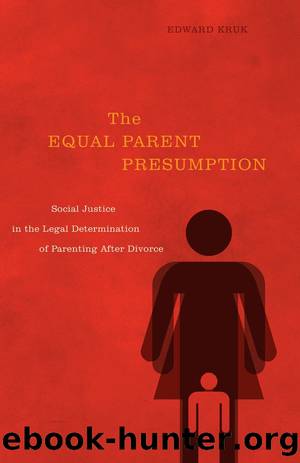The Equal Parent Presumption by Kruk Edward;

Author:Kruk, Edward;
Language: eng
Format: epub
Publisher: McGill-Queen's University Press
Published: 2013-08-15T00:00:00+00:00
2 Equal parenting preserves parentsâ relationships with their children. Just as children need both parents, so parents need their children in their lives. Studies have demonstrated that equal parenting has salutary effects on parents, as well as a positive enhancement of parental adjustment to the consequences of divorce (Bauserman 2002 and 2012; Melli and Brown 2008; Neoh and Mellor 2010). Primary among the benefits for parents with equal parental responsibility are better physical and emotional health, and less stress, resulting from the sense of purpose and personal gratification associated with active parenting; the highest levels of depression occur among adults who have a child under the age of eighteen with whom they are not living or actively involved (Neoh and Mellor 2010; Evenson and Simon 2005). The most salient loss for parents in the divorce transition is that of their children and their parental identity (Kruk 2010a; Kruk 2010b). The constraints of the traditional access relationship following divorce are strongly associated with contact loss (ibid), as 30 % of children of divorce have no contact with their non-residential fathers (Amato, Meyers, and Emery 2009). At the same time, the number of non-residential mothers is increasing, and they experience similar adjustment problems associated with the absence of their children (Kruk 2010b).
Twenty years ago, I found that parents who lost contact with their children following divorce suffered a grief reaction containing all the major elements of a bereavement (Kruk 1991). Today these parents are manifesting an even more pronounced reaction of post-traumatic stress, as they are acutely aware of the consequences of their absence in their childrenâs lives. The loss of oneâs children and the parent role is a defining and organizing experience that forms the core of non-resident parentsâ post-divorce identity. These parents routinely report increasing isolation, loss of employment, and inability to form or sustain new relationships, and these impacts are connected to more disturbed patterns of thinking and feelings, including shame, stigma, self-blame, and learned helplessness and hopelessness about the future (Kruk 2010a; Kruk 2010b). As mentioned, a suicide epidemic has been identified among divorced fathers without custody, linked directly to family court judgments that remove them as routine caregivers of their children (Kposowa 2000).
An equal-parental-responsibility presumption would go a long way toward preventing parental disengagement from childrenâs lives in situations in which parents want to maintain an active role as caregivers to their children, but are prevented or constrained from doing so by custody orders that remove them as primary caregivers. The fact that these parents want to live with their children and seek at least a shared care arrangement is a reflection of their attachment to their children (Kruk 2010a; Kruk 1993b). Contrary to the claims of equal parental responsibility opponents (Jaffe, Lemon, and Poisson 2003), there is no evidence that parents who seek custody of their children are doing so for reasons such as avoidance or reduction of child support payments, leverage in property settlement, or to continue their domination over their former spouses (Maccoby and Mnookin 1992).
Download
This site does not store any files on its server. We only index and link to content provided by other sites. Please contact the content providers to delete copyright contents if any and email us, we'll remove relevant links or contents immediately.
Mary Lincoln's Insanity Case by Jason Emerson(179)
Bioethics and Biopolitics in Israel by Hagai Boas Yael Hashiloni-Dolev Nadav Davidovitch Dani Filc and Shai J. Lavi(154)
Exposed by WILLIAM BERNHARDT(136)
We Do! by Jennifer Baumgardner(133)
Hopes for Better Spouses by Roeber A. G.;(133)
Why Surgeons Struggle with Work-Hour Reforms by James E. Coverdill John D. Mellinger(129)
Not Your Mother's Divorce by Kay Moffett(129)
The Equal Parent Presumption by Kruk Edward;(129)
Causation in Law and Medicine by Mendelson Danuta;Freckelton Ian; & Danuta Mendelson(127)
Not Just Roommates by Elizabeth H. Pleck(125)
The History of Marriage Equality in Ireland: A Social Revolution Begins by Sonja Tiernan(125)
Framing Abuse by Jenny Kitzinger(120)
Polygamy in Primetime by Janet Bennion(117)
Principles and Practice of Trial Consultation by Stanley L. Brodsky(117)
Divorce in Nevada by Willick Marshal S;(116)
Divorce in New York by Stutman Michael;(101)
Child Welfare in the Legal Setting by O'Brien Thomas M.;(100)
Divorce in Nebraska by Koenig Susan Ann;Koenig Susan Ann;(98)
Divorce in Tennessee by Burch Eric J.;(94)
